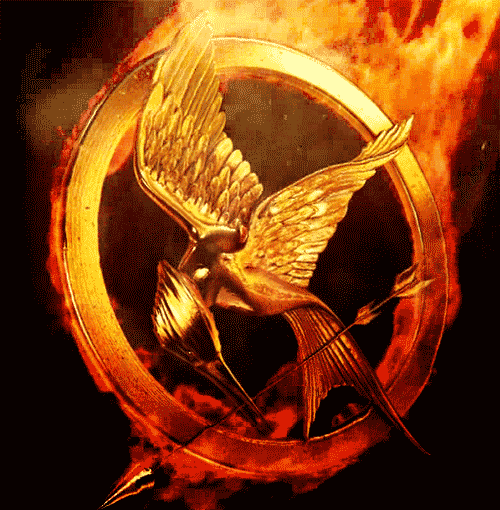Sunday, August 26, 2012
The Hunger Games.
DISCLAIMER:: If you have not had the pleasure of reading this book yet and are really, really wanting to, I suggest that you STOP reading this entry!! I don't want to spoil anything for you, and if you are one of the few who haven't checked out this trilogy yet, well, get off my site and go buy the books and get to it!
For those of you who may not be aware of the story line behind Suzanne Collins' books, here's some background information for you. The Hunger Games is a dystopian novel set in the future. America as we know it has fragmented into different sections-or districts-according to the valuable resource in which each area specializes. The country is subdued by a tyrannical government called the Capitol, which keeps Panem in place by enforcing a yearly Hunger Games tournament, in which children ages 12-18 enter into combat with each other and fight to the death. Not a very bright, cheery storyline, I know.
First of all, I wanted to say that though it won't be my main focus, there will be times in this review when I compare the Suzanne Collins book to the movie adaptation. I can't help it; I recently re-watched the movie at the cheap theater here in town, so the differences are glaringly obvious and fresh in my mind right now!
The first thing you notice about this book is that it is told from the viewpoint of Katniss, a 16-year-old tribute from District 12, which is arguably modern-day Appalachia. When Katniss tells us about growing up in District 12 and her everyday fight to provide for her family, you get a very impersonal, no-nonsense tone. She is blunt with her descriptions of killing her own game and breaking the law to do so. Katniss speaks in sentence fragments throughout most of the first few chapters, which only adds to the bleak, detached tone.
I think this tone changes as soon as Katniss volunteers as tribute and leaves her home with Peeta to compete in the Games. She at first is threatened by Peeta's kindness--probably because she hasn't experienced that from anyone since her father died. She doesn't know what to do with the kind "boy with the bread"; this doesn't really change by the end of the book, either! At any rate, her interactions with Peeta bring out a more personable tone from the character of Katniss.
Some see this book as another tale of the bravery of children and the triumph of the underdog. We should note that this book is also about the protest of government and social revolution. It's important to remember this when you read it, because you begin to see how Katniss rebels against the Capitol. For example, when another tribute named Rue dies and Katniss arranges flowers around the dead girl's body, she has not only forged a relationship with her enemy in the Games, but has also showed all of Panem that she doesn't care what her actions signify; she just wants to honor the dead. This act follows with District 11 (Rue's district) sending her bread when Katniss desperately needs it. I'm not sure that the movie accurately portrays how dangerous these actions are and the domino effect of rebellion that Katniss has begun. This gift of bread marks the first time in Hunger Games history that a district has sent another district's tribute aid in a time of need, which is a HUGE deal.
I just really, really love these books. I love them in the sense that Katniss, a teenager, starts a rebellion in her society and causes her country to band together as they have not in decades. I adore them because love and purity triumph all, not dominance and politics. It's important to realize the power of children and the underdog in literature: you can picture Harry Potter and his triumph over Lord Voldemort, or Frodo and his destruction of the evil ring of power.
I'll leave you with one of my favorite passages in the book. In Chapter 18, after Katniss has sung Rue to her eternal slumber, and the girl has died:
"The words are easy and soothing, promising tomorrow will be more hopeful than this awful piece of time we call today".
Subscribe to:
Post Comments (Atom)

This is a thrilling review:) One thing I love about this trilogy is it really does make you think about everything from love to politics and from right to wrong. These books I could read over and over. On a side note: I read the books before the movie and the movie was very disappointing, more than I expected. Sadly the movie has turned a few people I know away from giving the books a chance.
ReplyDelete